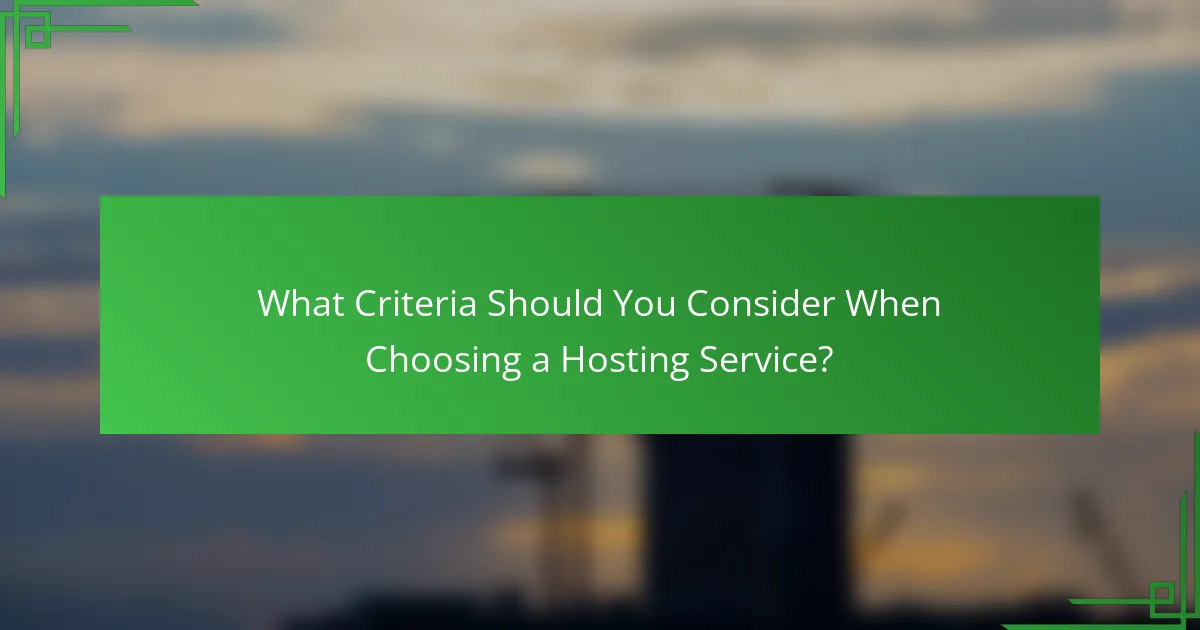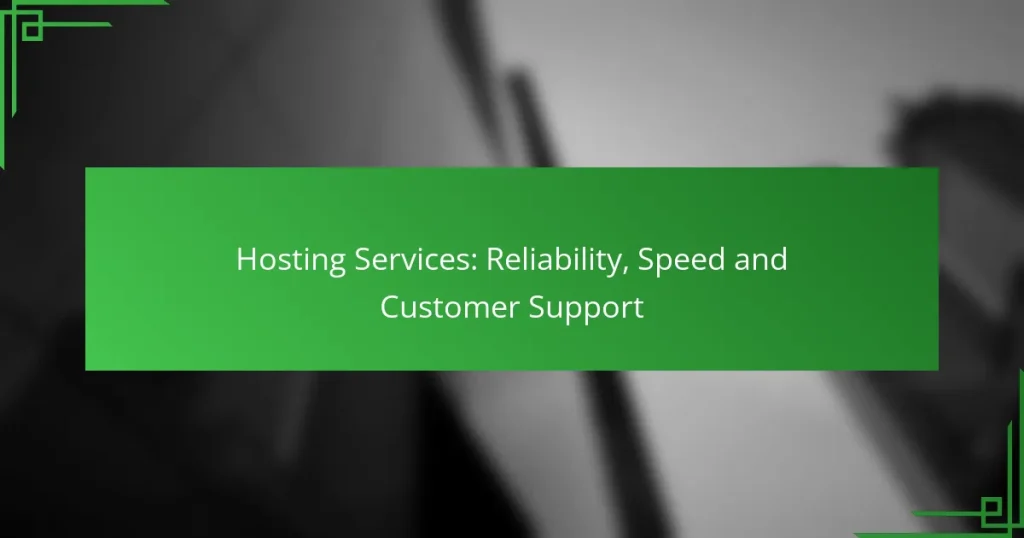When selecting a hosting service, reliability, speed, and customer support are crucial factors that can significantly impact your website’s performance. Consistent uptime ensures your site is always accessible, while fast loading times enhance user experience and retention. Additionally, responsive customer support can make a vital difference when addressing technical issues, ensuring smooth operation and peace of mind.

What Are the Most Reliable Hosting Services?
The most reliable hosting services are those that consistently deliver uptime, speed, and customer support. Key factors to consider include server uptime percentages, response times, and the quality of technical assistance provided.
Bluehost Reliability
Bluehost is known for its strong uptime performance, typically exceeding 99.9%. This reliability is supported by robust infrastructure and a commitment to maintaining server health.
When choosing Bluehost, consider their customer support options, which include 24/7 live chat and phone support. This ensures that any issues can be addressed promptly, minimizing downtime.
SiteGround Reliability
SiteGround boasts impressive reliability with a 99.99% uptime guarantee. Their use of advanced technology, such as SSD storage and caching, enhances website speed and performance.
SiteGround’s customer support is highly rated, with quick response times and knowledgeable staff available around the clock. This combination of reliability and support makes it a strong choice for businesses.
HostGator Reliability
HostGator offers reliable hosting services with an uptime guarantee of 99.9%. They utilize a network of data centers to ensure that websites remain accessible even during high traffic periods.
While HostGator provides solid uptime, their customer support can be hit or miss. It’s advisable to test their support channels before committing to ensure they meet your needs.
InMotion Hosting Reliability
InMotion Hosting is recognized for its reliable service, with a 99.9% uptime guarantee. Their servers are optimized for speed, which contributes to overall site performance.
Their customer support is available 24/7 via phone, chat, and email, making it easy to get help when needed. InMotion is particularly well-suited for businesses that require consistent performance and support.
A2 Hosting Reliability
A2 Hosting is known for its high reliability, offering a 99.9% uptime commitment. They focus on speed optimization, which can significantly enhance user experience on hosted websites.
Customer support at A2 Hosting is available 24/7, and they are known for their responsiveness and expertise. This makes them a good option for those who prioritize both reliability and support in their hosting service.

How Does Hosting Speed Impact Performance?
Hosting speed directly affects website performance, influencing load times and user experience. Faster hosting leads to quicker page loads, which can enhance visitor retention and satisfaction.
Importance of Speed
Speed is crucial for maintaining an engaging online presence. A website that loads in just a few seconds can significantly reduce bounce rates, while delays can frustrate users and drive them away. Generally, aim for load times under three seconds for optimal user experience.
Additionally, hosting speed impacts the overall functionality of web applications. Faster servers can handle more requests simultaneously, ensuring that users experience smooth interactions without lag.
Fastest Hosting Providers
When selecting a hosting provider, consider those known for their speed. Providers like SiteGround, A2 Hosting, and Bluehost often rank highly for performance due to their optimized server configurations and content delivery networks (CDNs).
Comparing hosting plans, look for features such as SSD storage, caching solutions, and global data center locations, which can all contribute to faster load times. Many providers offer trial periods, allowing you to test their speed before committing.
Impact on SEO Rankings
Website speed is a critical factor in SEO rankings. Search engines like Google prioritize fast-loading sites, as they provide a better user experience. A slow site can negatively affect your search visibility and lead to lower traffic.
To improve your SEO, regularly monitor your website’s speed using tools like Google PageSpeed Insights or GTmetrix. Aim for a performance score above 90, and address any issues that may slow down your site, such as large image files or excessive scripts.

What Customer Support Options Are Available?
Customer support options for hosting services typically include live chat, email, and phone support. The availability and quality of these options can significantly impact your experience, especially during critical issues.
24/7 Support Services
Many hosting providers offer 24/7 support services to assist customers at any time. This round-the-clock availability is crucial for businesses that rely on their websites being operational at all hours. Look for providers that guarantee quick response times, ideally within minutes.
When evaluating 24/7 support, consider the channels available, such as phone, chat, or ticketing systems. A provider with multiple options can offer more flexibility in how you seek help.
Live Chat vs. Email Support
Live chat support is often preferred for its immediacy, allowing users to receive real-time assistance. This can be particularly useful for urgent issues that require quick resolution. However, response times can vary based on the provider’s staffing and peak hours.
Email support, while generally slower, allows for more detailed communication and documentation of issues. It’s beneficial for non-urgent matters where you may need to provide extensive information or screenshots.
Top Hosting Providers for Support
Some of the top hosting providers known for their customer support include Bluehost, SiteGround, and HostGator. These companies typically offer robust support options, including 24/7 availability and multiple contact methods.
When choosing a hosting provider, consider reading customer reviews specifically about their support services. Look for feedback on response times, helpfulness, and overall satisfaction to ensure you select a provider that meets your needs.

What Criteria Should You Consider When Choosing a Hosting Service?
When selecting a hosting service, prioritize reliability, speed, and customer support. These factors significantly impact your website’s performance and user experience, making it essential to evaluate each criterion carefully.
Uptime Guarantees
Uptime guarantees indicate the percentage of time your website will be operational. Look for providers that offer at least 99.9% uptime, which translates to minimal downtime over a year—typically just a few hours. Higher uptime percentages often come with service level agreements (SLAs) that outline compensation for any downtime experienced.
Consider the implications of downtime on your business. Frequent outages can lead to lost revenue and damage your brand’s reputation. Therefore, choose a host with a proven track record of reliability.
Pricing Structures
Pricing structures can vary widely among hosting services, so it’s crucial to understand what you’re paying for. Look for transparent pricing without hidden fees, and compare plans based on features like bandwidth, storage, and support. Many providers offer introductory rates that increase after the first term, so factor in long-term costs.
For example, shared hosting plans may start as low as $5 per month, while dedicated servers can range from $100 to several hundred dollars monthly. Assess your budget and needs to find a plan that offers the best value.
Scalability Options
Scalability options determine how easily you can upgrade your hosting resources as your website grows. Choose a provider that offers flexible plans, allowing you to scale up bandwidth, storage, or even switch to a more robust hosting type without significant downtime.
For instance, if you anticipate rapid growth or seasonal traffic spikes, look for cloud hosting solutions that can automatically adjust resources. This adaptability can save you from performance issues during peak times and ensure a seamless experience for your users.

How Do Hosting Services Compare in Terms of Features?
Hosting services vary significantly in features, impacting reliability, speed, and customer support. Choosing the right type depends on your specific needs, such as traffic levels, technical expertise, and budget constraints.
Shared vs. VPS Hosting Features
Shared hosting involves multiple websites sharing a single server’s resources, making it a cost-effective option for small sites. However, this can lead to slower speeds and reduced reliability during peak traffic times.
VPS (Virtual Private Server) hosting provides a dedicated portion of server resources, offering better performance and reliability. It is ideal for growing websites that require more control and customization without the higher costs of a dedicated server.
Managed vs. Unmanaged Hosting
Managed hosting services take care of server management tasks, including updates, security, and backups, allowing users to focus on their website content. This is beneficial for those who prefer convenience and have limited technical skills.
Unmanaged hosting requires users to handle server management themselves, which can be cost-effective but demands technical expertise. This option is suitable for experienced users who want full control over their server environment and configurations.


